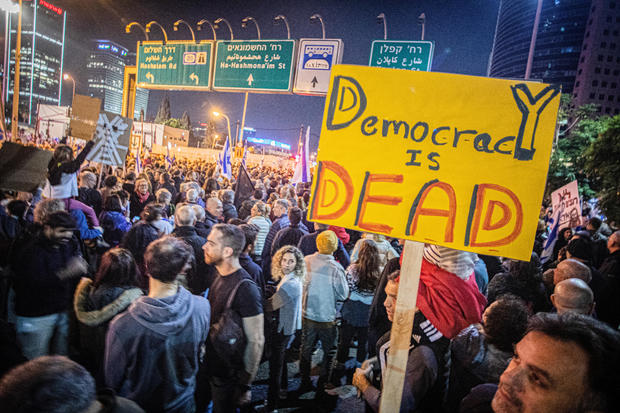Thousands hit Israel’s streets to protest “scary” new government under Benjamin Netanyahu
Tel-Aviv — About 100,000 Israelis took to the streets on Saturday for the third week of demonstrations against the country’s new far-right, ultra-religious government.
To secure his sixth term as Israel’s Prime Minister, Benjamin Netanyahu has formed a coalition with extremist political parties that support the introduction of more severe anti-Palestinian legislation, including banning the Palestinian flag in public spaces and expanding Jewish settlements in the West Bank that are illegal under international law. Some coalition members also support amendments to Israeli laws that protect the rights of women, LGBTQ people and other minority groups.
Sarah, 15, and her friend Noam joined the protest in Tel Aviv alongside some 80,000 others last weekend. She told CBS News they would consider moving to a different country if some of the changes suggested by the hardline coalition members were enacted.
“We care about our future and our generation… our rights, like women’s rights and Palestinian people rights, homosexuality, everything,” Sarah told CBS News. “We are dancers and we think about how we could express ourselves here. I don’t know (what it) could be like in several years. Like, if women can sing or stuff like that. You don’t know where it can go. So I always think about, like, maybe I’ll leave, and leave my family and my memories here. It’s very scary.”
Getty Images
Netanyahu’s government has also proposed reforms to the country’s supreme court that could undermine the independence of the nation’s judiciary, allowing politicians to potentially overrule court decisions. That, critics say, is a direct threat to Israel’s democratic system of checks and balances and could benefit Netanyahu himself as he faces an ongoing trial over alleged corruption.
Moshe Chertnov, who joined the protests, moved to Israel from Los Angeles in the 1970s to build a new life on a socialist kibbutz. He said he was devastated about the hardline direction the country was going.
“I’m concerned with letting them get away with things that should normally take a two-thirds majority in any other country and not a slim majority, as they have. No one’s denying the fact that they won, and democratically… We’re not election deniers. But we have to put a stop to this in every single way,” Chertnov told CBS News. “This is so far from anything I would ever, ever imagine that happen. It’s hard to see this.”
Boaz Bismuth, a member of Israel’s parliament, the Knesset, from Netanyahu’s right-wing Likud party, insisted that the prime minister would fight any members of his coalition who seek to restrict rights for Israeli citizens.
“Don’t forget, we are the main party. We are the leading party and we are liberals, and we will not agree to anything, anything that will allow this inequality in our country,” he told CBS News.
But Bismuth said he was firmly against a two-state solution — the long-standing premise for peace talks that envisions Israel and a future state of Palestine as independent, neighboring countries. That in itself, according to many critics, belies Bismuth’s vow to prevent “inequality” in the country, where Palestinians and other minorities already face discrimination.
Israel’s new government has already moved to further penalize Palestinians in a number of ways, saying it will cut millions of dollars in funding for the Palestinian Authority and vowing to act against groups carrying out “hostile activity” in the occupied West Bank, including those that take “political and legal action against Israel under the guise of humanitarian work,” the Associated Press reported. Advocates fear that anyone involved in human rights work for Palestinians in the occupied territories could be targeted.
Power over the police has already been consolidated under Israel’s new national security minister, Itamar Ben-Gvir, a radical ultranationalist convicted years ago of inciting racism and supporting a terrorist organization. He was previously heard chanting “death to Arabs,” and has been on camera encouraging violence against Palestinians.
“I think there is enough reasons after the appointment of that Israeli politician to feel constant fear,” Mounir Marjieh, international advocacy coordinator at the Community Action Center, which aims to empower Palestinians in East Jerusalem, told CBS News. “He will set the policy for the police, for opening interrogations, for prosecution, and he will change, he said, open-fire regulations against civilians. I think that this will severely affect human rights.”
For all the latest World News Click Here
For the latest news and updates, follow us on Google News.


